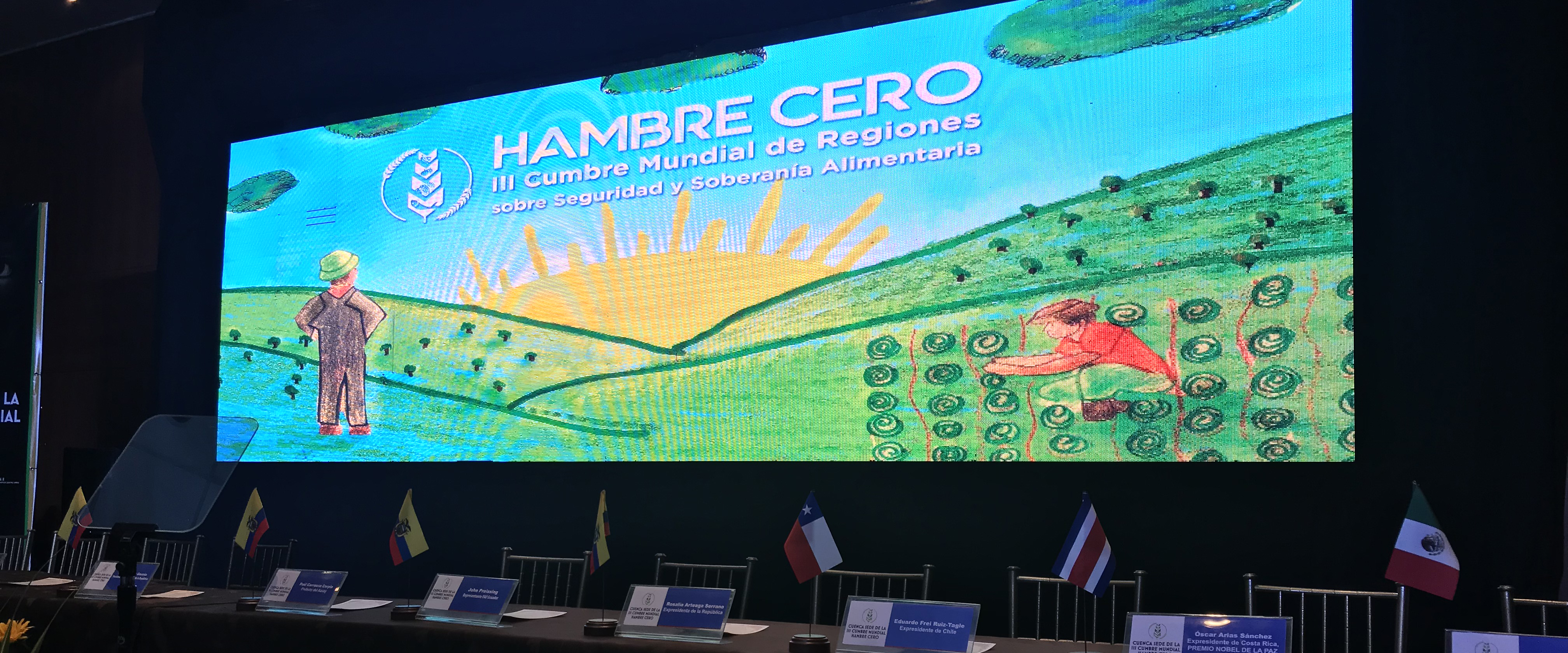The third Summit of Regions “Zero Hunger”

Gustavo Baroja
Prefect of Pichincha and President of CONGOPE
Since 2008, ORU FOGAR has been working on the issue of Food Security, both in specific food security projects and at international summits in Dakar (2010) and Medellin (2012). The third summit, held in the city of Cuenca-Ecuador on the 27th and 28th of April, presented us, as regional governments, with a series of challenges, set out in the "Charter of Cuenca"
Hunger affects 800 million people, one in ten people in the world. Although it is recognized that efforts to achieve the MDGs have achieved a significant reduction, much remains to be done if we are to end hunger, an objective we believe is possible, provided that the commitments and guidelines to which we committed ourselves at this meeting are responsibly undertaken.
In its Constitution, Ecuador has incorporated the issues of food security and sovereignty as rights guaranteed by the State, beyond the "right to food". We also recognize that the "double burden" of malnutrition is very strongly expressed in the country, whose actions to reduce malnutrition have not yet had the expected results (the reduction over a 10 year period of chronic malnutrition was just of two percentage points, from 26 to 24%), and the problem of malnutrition appears as a paradox, since for example diabetes in our country is becoming the leading cause of death, and the health problems linked to obesity are increasingly important in health care.
The intermediate governments, known as provincial governments, have the competencies to promote production and the environment, which allow them to establish programs that affect the goal of zero hunger; but they do not have competencies in health and care issues for particularly vulnerable populations (such as children, the elderly, pregnant women), or in marketing issues, which would allow them to take more comprehensive action in our territories. The discussion of these issues, around the deepening of decentralization, is now on the "agenda" of the state reform in Ecuador. The Summit has been a significant boost, which we have co-organised.
The goal of ending hunger implies a policy change, targeted investments, serious political commitments: the subnational (including local) governments must collectively address the issue. It cannot be an action of only one level of government, although we do claim the role of intermediation, the linkage and articulation of the multiple public, private and community actors, as a function that intermediate governments should assume.
It is in the territory where policies must be resolved and implemented to meet global objectives. In this respect, it is vital to strengthen the capacity for dialogue between ORU-FOGAR and other organisations of cities and regions before the international organisations, especially the United Nations, as a way of influencing the definition of global policies, objectives and goals, as well as in the territorial implementation at a local level.
It is important to emphasize that 80% of the people in extreme poverty are in rural areas, and in marginal areas inhabited by the population expelled from the countryside. Efforts to overcome poverty should therefore be directed towards closing the gaps between urban and rural living standards. If the relationship between the city and the countryside is unequal, it is impossible to speak of development. This leads us to consider it as a strategy of "integral" planning. Although we can theoretically distinguish an "urban" agenda, development requires that we look at the whole territory, that we can solve the unequal conditions of income, of access to health or education rights, of decent housing, of transport, which we continue to find in rural areas.
The sustainability of food production systems is linked to agro-ecological production: to produce agro-ecologically is to guarantee health, to maintain a relationship of communion with nature, and it has to do with the recovery of ancestral knowledge. All of this, without neglecting the progress obtained by research, science and technology. We recognize that the first objective for nutritional security is to improve the production of healthy and adequate food, with sufficient nutrients, that does not generate adverse health effects in the short or medium term.
This means supporting producers, including their demands for access to land, water, technology, capital and markets. It is also important that they are heard in the construction of agrifood policies and systems, from which they have often been excluded. Along these lines, the Cuenca meeting sought to articulate the concepts of "security" and "food sovereignty", which we see as complementary. It is always possible, as Cuenca showed, to engage in dialogue and find consensus. And, once again, this is an issue in which we Regional Governments can find a role of articulation, of facilitating policy dialogue, of building spaces of governance open to all actors and positions.
The construction of sustainable territorial agri-food systems then becomes an important function of regional governments. The links of this issue with climate change must be addressed responsibly. We find in agricultural production a high dependence on fossil fuels that increases climate deterioration, while there are alternatives for the use of clean technologies. We find that the largest production of greenhouse gases in some countries comes from livestock farming, while it is possible to promote 'intelligent' livestock farming. We find a high waste amounting to a quarter and a third of the food produced, while it is possible to introduce good management practices in all the links of the productive chains. There are changes that are in our hands, as regional governments.
The Zero Hunger objective is absolutely anchored to the objectives of eradicating poverty, ensuring safe drinking water, improving productivity, or the proper management of ecosystems. The objectives cannot be achieved in isolation, but, as former Spanish President Rodríguez Zapatero told us at the meeting in Cuenca, it is an objective that we can achieve. We can be the generation that ended hunger (and malnutrition). The role of regional or intermediate governments will be vital to achieve this goal.







































































